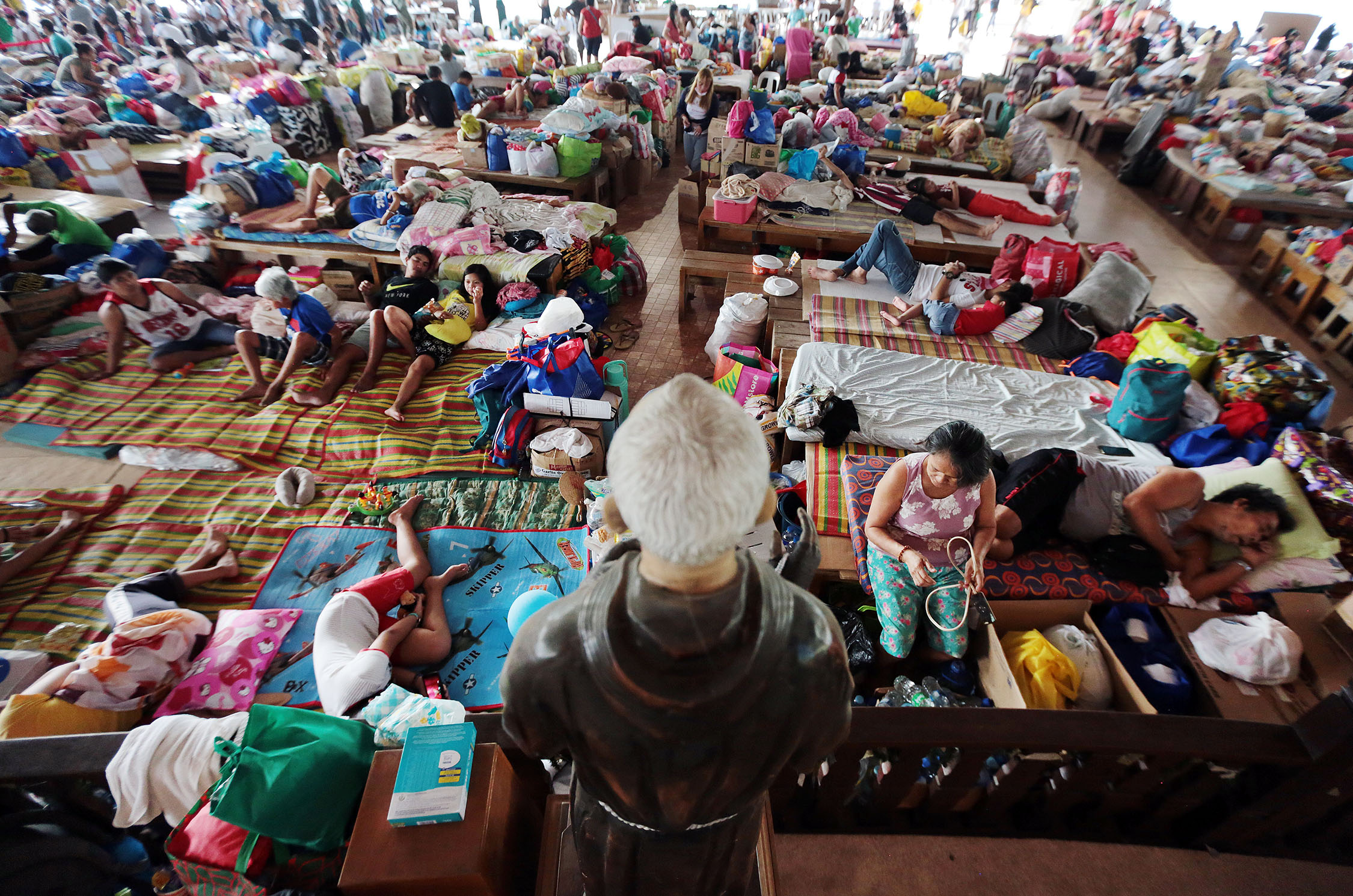No social distancing for Taal evacuees

HEALTH RISK In this photo taken on Jan. 20, residents fleeing the eruption of Taal Volcano in Batangas province seek temporary shelter at the National Shrine of Padre Pio in the City of Sto. Tomas. Today, families displaced from the Volcano Island remain in evacuation centers in Laurel, Talisay and Ibaan towns,making them vulnerable to the coronavirus. —GRIG C. MONTEGRANDE
SAN PEDRO CITY—How can you observe social distancing in evacuation centers?
Social distancing, or keeping about a meter distance between two persons particularly in public places, is one of the practical ways to slow down the spread of the new coronavirus disease (COVID-19).
But at Barangay Tumaway in Talisay town, Batangas province, keeping distance is impossible when hundreds of families displaced by the steam-driven eruption of Taal Volcano in January live in a single building.
While there are modular tents, some covered with blankets at night for privacy, families share common bathrooms and mess halls.
In Ibaan town, about 500 families in Barangay Talaibon, who also lost their homes to the eruption, stay in row houses with shared walls. Some units are also without water or power connection, driving people to the common deep well or to their neighbors’ doors to charge their phones and other electronic gadgets.
Article continues after this advertisementBarred from leaving
“It’s really hard. We just don’t go out [or leave the evacuation center],” said Angel Ann Mendoza, 20, who stays with her 80-year-old grandmother and relatives with newborns in the Tumaway center.
Article continues after this advertisementPolicemen patrol the Ibaan resettlement to break up small crowds of people or send children playing around back home. Evacuees were also barred from leaving the evacuation site.
According to the Batangas Department of Social Welfare and Development (DSWD), at least 800 families permanently displaced from the Volcano Island are still in evacuation sites in Laurel, Talisay and Ibaan towns.
The Philippine Institute of Volcanology and Seismology on Thursday lowered the alert level to 1, as the volcano showed a “decreasing trend” of activity since its steam-driven blast on Jan. 12. However, state volcanologists cautioned the public to remain vigilant and asked those in high-risk areas who have returned home to continue to be prepared for evacuation.
Food, water supplies
The local government is still looking for permanent settlement for the families from the Volcano Island, or Pulo, which has since been declared a permanent danger zone.
“We still haven’t completely recovered from the [Taal] eruption and now this virus,” Mendoza lamented.
Pablo Basilio said he and fellow evacuees in Ibaan listened to updates on the virus through radio reports.
What concerns them, he said, are not the travel restrictions or checkpoints but the flow of relief goods prevented by the lockdown.
“We still have a few canned goods left. These should last another week or two,” he said.
Mendoza was worried about the supply of clean and drinking water specially as children began catching what they hoped to be just common colds and fever. Batangas, so far, has recorded five cases of infection.
Joy Montalbo, head of the Batangas DSWD, said the stop in the donation and relief drives for Taal victims was only temporary or until the lockdowns are lifted.
But before the day was over on Wednesday, more local governments in Luzon and in the Visayas initiated their own “total lockdowns,” effectively hampering any chance of goods flowing from one province to the next.
In Laguna province, officials of Sta. Maria, Mabitac, Famy, Siniloan, Pangil, Pakil, Paete, Kalayaan and Rizal declared a total lockdown of their towns.
Also on Wednesday, Albay province was placed on total lockdown following the closure of all borders to ban the entry of people from other Bicol provinces.
Intensified restrictions
In the Visayas, the cities of Iloilo and Tacloban would begin implementing the “intensified restrictions” in their areas starting March 20 and 21, respectively.
Iloilo City Mayor Jerry Treñas said public utility vehicles would still be allowed to operate but only for “travel for essential purposes,” such us to ferry food.
In Tacloban City, Mayor Alfred Romualdez ordered all establishments closed except for a few businesses involved in food, medicine and other basic commodities.
In Cebu City, Mayor Edgardo Labella ordered the closure of all malls, which were earlier allowed to operate shorter hours, until further notice. Only supermarkets, pharmacies, money remittance centers, hardwares and banks in these malls are allowed to stay open. —WITH REPORTS FROM JHESSET O. ENANO, KIMMY BARAOIDAN, MAR ARGUELLES, JOEY GABIETA, NESTOR BURGOS JR., DALE ISRAEL AND NESTLE SEMILLA
For more news about the novel coronavirus click here.
What you need to know about Coronavirus.
For more information on COVID-19, call the DOH Hotline: (02) 86517800 local 1149/1150.
The Inquirer Foundation supports our healthcare frontliners and is still accepting cash donations to be deposited at Banco de Oro (BDO) current account #007960018860 or donate through PayMaya using this link.